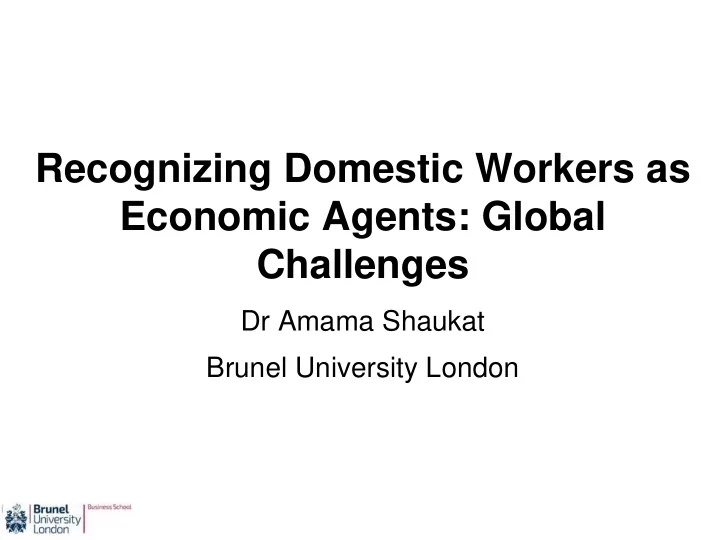

Recognizing Domestic Workers as Economic Agents: Global Challenges Dr Amama Shaukat Brunel University London
Current Global Status of Domestic Work Sector – General Trends Possibly the single largest sector providing employment in the developing countries Predominantly comprised of women workers (about 80% in Asia- Pacific countries, according to ILO, 2016) Characterised by extremely low levels of skills (especially in the poorer and lower income developing countries like Pakistan) Almost no barriers to entry – of age, skills, gender etc. almost anybody from the age of 8 or 9 years onwards can become or be forced to become a domestic worker, especially in developing countries like Pakistan Dr Amama Shaukat 11 April 2018 2
Current Global Status of Domestic Work Sector – General Trends Informal and totally unregulated in most countries globally, including developed and developing countries (the few exceptions being South Africa, Argentina) The most excluded and invisible category of workers (from labour regulation/laws, and state, sector or employer support) Characterised by extremely low wages, extremely long working hours and no clear description of duties to be undertaken Dr Amama Shaukat 11 April 2018 3
Prior Research on Domestic Workers Early research (relating to industrial era) largely undertaken from a sociological/anthropological perspective (e.g. most essays in Fauve-Chamoux (2004). More recent research also from a similar perspective (e.g. ILO, 2016) Recent research focussed largely on cross-country migrant workers - no research on rural-urban migrants in developing countries Recent research focussed on issues like access to health and social security (Jayaweera, 2016); access to and extent of legal protection (ILO, 2013; Shahid, 2007); and worker profiles and living and working conditions (ILO, 2016) Dr Amama Shaukat 11 April 2018 4
Limitations of Prior Research on Domestic Workers Given the disciplinary perspective (sociological/anthropological) most prior research is largely qualitative and descriptive in nature It is small sample based, cross country migrant focussed, ignores rural-urban migrants and thus is not amenable for developing broad generalisations More importantly given the disciplinary focus, prior research tends to underemphasize the economic nature of domestic work – often labelling it as being ‘non - productive’ labour – a notion dating back to Adam Smith (1776) as cited by Sarasua (2004) Dr Amama Shaukat 11 April 2018 5
Agenda for Future Research on Domestic Workers It is now high time to recognize the economic contribution of the domestic work sector in all countries – to find ways and means of recognizing, measuring and recording this contribution Among the first steps toward this goal would be to conduct systematic large sample based academic research on domestic work sector and workers from an economic/business perspective Dr Amama Shaukat 11 April 2018 6
Agenda for Future Research on Domestic Workers Research that recognizes domestic work as an economic activity and workers as economic agents, with all its ensuing implications for: ˗ domestic worker mobility (particularly rural-urban) and their mobilization ˗ Work contracts ˗ wages ˗ worker productivity ˗ skill requirements and training provision ˗ recognition and inclusion in relevant labour regulations ˗ appropriate institutional support and ultimately for achieving the goal of decent working and living conditions for domestic workers around the world including Pakistan. Dr Amama Shaukat 11 April 2018 7
Recommend
More recommend